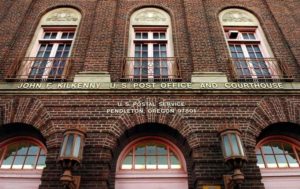“The American Government Works” by Tom Hebert (Nigeria)
The American Government Works
A column by Tom Hebert (Nigeria 1962-64)
Published on November 2,2018

The Pendleton Post Office was built in 1916 during a time of support for the U.S. government.
Next time you’re in downtown Pendleton, visit the post office at the corner of Southwest Dorion and First Street. There, on an old plaque cemented to the wall are the words:
“This brick building was constructed in 1916 by the Federal Government and has been in continuous use as a Post Office and Courthouse since that time … The symmetry and classical elements of the style create a feeling of monumentality and permanence appropriate to civic structures. The confidence in the government inspired by public buildings of this time must have seemed particularly important at a time when the front page of the newspaper was devoted almost entirely to the developments of the First World War. This building is listed on the National Register of Historic Places.”
Can you imagine such positive words about the American government appearing on a government wall plaque today? How times have changed.
First of all, I’m a liberal Democrat. How best to understand the likes of us? Probably the most venerated federal judge in American history was Learned Hand. On May 21, 1944, one and a half million met in Central Park for the annual “I Am an American Day.” Judge Hand was the featured speaker:
“What then is the spirit of liberty? I cannot define it; I can only tell you my own faith. The spirit of liberty is the spirit which is not too sure that it is right; the spirit of liberty is the spirit which seeks to understand the mind of other men and women.”
To cut to the chase, do Americans pay higher taxes than other countries? The answer is no. From a 2017 Time magazine article: “With a tax burden of 25 percent — a measurement that includes income, property, and various other taxes — the U.S. is near the very bottom, well below the overall average of 34 percent. It ranks below all the measured countries except Korea, Chile, and Mexico.”
But President Trump has said that our taxes are “just about the highest in the world.”
The U.S. government may not be perfect, but many of its programs have had lasting effects on the nation. The Brookings Institute has researched domestic and foreign government programs to compile a list of Government’s Top 10 Greatest Achievements, part of a study of the government’s 50 greatest endeavors:
- Rebuild Europe After World War II
- Expand the Right to Vote
- Promote Equal Access to Public Accommodations
- Reduce Disease
- Reduce Workplace Discrimination
- Ensure Safe Food and Drinking Water
- Strengthen the Nation’s Highway System
- Increase Older Americans’ Access to Health Care
- Reduce the Federal Budget Deficit
- Promote Financial Security in Retirement
Thus, government can work wonders but only if the leadership truly wants it to. And of course, government service has to be honored. Now, both government and government service are often ignored, attacked, and not defended.
So, how are effective federal government programs created?
Roosevelt’s Civilian Conservation Corps took 37 days from his inauguration on March 4, 1933, to the induction of the first enrollee on April 7, 1933. It’s a shame we no longer have presidents who speak to us in fireside chats so that the American people can learn of the world and major issues like they did during his time in office.
These were the most essential words of Roosevelt’s Tennessee Valley Authority as presented to Congress on April 10, 1933. From his cover letter: “I, therefore, suggest to the Congress legislation to create a Tennessee Valley Authority — a corporation clothed with the power of government but possessed of the flexibility and initiative of a private enterprise.” Within 90 days TVA was fast-tracking Norris Dam to an early completion.
Another fast start-up: On February 6, 1961, Sargent Shriver, the founder of the Peace Corps, accepted a 30-page concept paper, “The Towering Task.” On March 1, 1961, President John Kennedy issued the Executive Order establishing the Peace Corps. Shriver had thus needed only 21 days to organize the agency. Volunteers were in the field by the fall.
The trigger event that founded the Peace Corps was when John Kennedy ended his January 18, 1961, inauguration speech with a line that defined my generation: “And so, my fellow Americans: Ask not what your country can do for you — ask what you can do for your country.” Well, we tried.
Writing as the liberal Democrat I admit to being, I believe the government problem we have today is the DOA gerrymandered Congress and the most political and activist Supreme Court in the nation’s history. The Court is setting policy and that improper role is also far to the right of what polls show most people want. Our bureaucracy is the finest the world has ever known. But, of course, after a couple decades of heated, abnormal political arguments and an exhausted electorate not voting as much as they once did, it has lots of barnacles.
All cultures have always had to provide for transitioning young boys and girls (braves) into warriors, who are simply men and women who put community before self. Yes, there’s a real need, here and now, for modern warriors.
The builders of our Post Office would agree.
•
Pendleton, Oregon is a prototypical western small town of 17, 000 people which was founded in 1865. The town is the cultural center of Eastern Oregon and home to American’s grandest rodeo, the Pendleton Round-Up. Pendleton lies right next to the Umatilla Indian Reservation, home of the descendants of the Cayuse, Umatilla, and Walla Walla Indians.
•

Tom Hebert, a writer and public policy consultant was a Peace Corps Volunteer in Nigeria from 1962 to 1964, directed USO Clubs while attached to the Marine Corps in Vietnam, 1966-68, and directed the Tennessee Valley Authority’s Center for Innovation from 1979 to 1987. He now lives on the Umatilla Indian reservation outside Pendleton, Oregon. Tom is also the co-author of three books on higher education and a columnist for the Confederated Umatilla Journal.

Thank You Tom & John. Good to know the Heartland has not only heart but smarts. Keep it up…